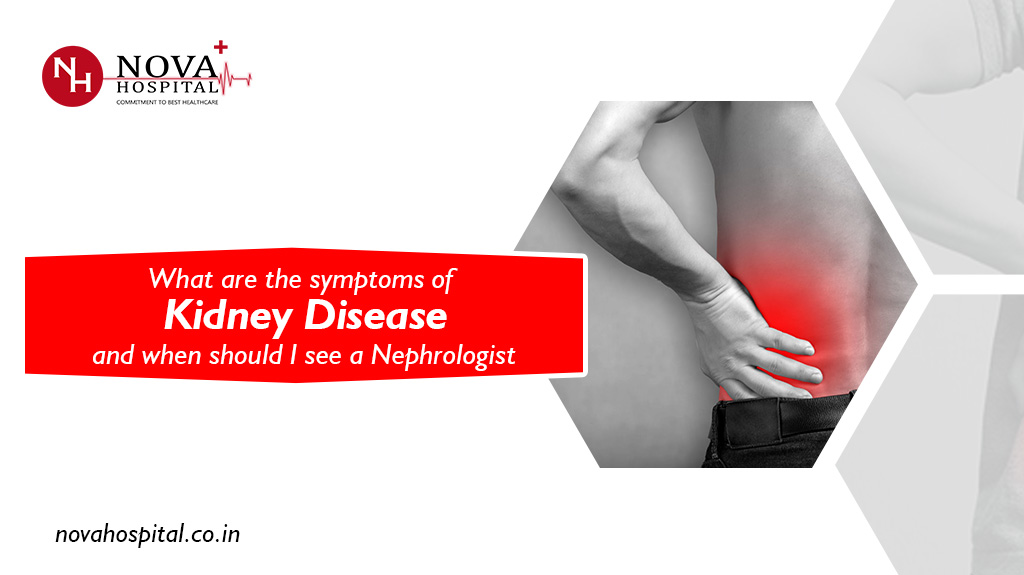What are the symptoms of kidney disease and when should I see a Nephrologist
Kidney disease is a common and serious health condition that affects millions of people worldwide. It can have a significant impact on a person’s quality of life and can even be life-threatening if left untreated. Early detection and management of kidney disease are essential to prevent further damage and improve outcomes. In this blog, we will discuss the symptoms of kidney disease and when to see a nephrologist for diagnosis and treatment.
Common symptoms of kidney disease
- Fatigue and weakness: feeling tired and weak even after rest and sleep.
- Swelling in hands and feet: fluid buildup in the body leading to swelling in the extremities.
- Difficulty sleeping: trouble falling asleep or staying asleep.
- Changes in urine frequency and appearance: changes in the frequency, color, and consistency of urine, such as dark, foamy, or bloody urine.
- High blood pressure: uncontrolled high blood pressure that does not respond to medication.
- Nausea and vomiting: feeling nauseous and vomiting frequently.
- Itching and dry skin: feeling itchy and having dry skin due to waste buildup in the body.
When to see a nephrologist
- Family history of kidney disease: if a close family member has kidney disease, you may be at increased risk.
- Chronic conditions such as diabetes or hypertension: these conditions can damage the kidneys over time and increase the risk of kidney disease.
- Persistent symptoms of kidney disease: if you experience any of the symptoms mentioned above for an extended period, you should seek medical attention.
- Abnormal laboratory tests: if you have abnormal laboratory test results, such as high levels of creatinine or protein in your urine, you may need to see a nephrologist.
- Presence of risk factors such as smoking or obesity: these lifestyle factors can increase the risk of kidney disease and may warrant a visit to a nephrologist.
Diagnosis and treatment
If you see a nephrologist for evaluation of kidney disease, they will likely conduct a thorough medical history, physical exam, and laboratory tests to diagnose and assess the severity of your condition. Some of the tests that may be conducted include:
- Blood tests: to measure the levels of creatinine, urea, and other waste products in the blood.
- Urine tests: to check for the presence of protein, blood, or other abnormal substances in the urine.
- Imaging tests: such as ultrasound, CT scan, or MRI, to evaluate the size and structure of the kidneys.
- Kidney biopsy: a procedure where a small piece of kidney tissue is removed and examined under a microscope to determine the cause of kidney disease.
The treatment for kidney disease will depend on the underlying cause and severity of the condition. Some of the common treatments may include:
- Medications: to manage blood pressure, control blood sugar levels, or treat underlying medical conditions that contribute to kidney disease.
- Lifestyle changes: such as regular exercise, maintaining a healthy diet, quitting smoking, and reducing alcohol consumption can help slow the progression of kidney disease.
- Dialysis: a procedure that removes waste products and excess fluid from the blood when the kidneys are no longer able to perform this function.
- Kidney transplant: a surgical procedure where a healthy kidney from a donor is transplanted into the body to replace the diseased kidney.
It is important to work closely with your healthcare provider and follow their recommendations for managing kidney disease to prevent further damage and improve outcomes. Regular monitoring and follow-up appointments are also crucial to assess the effectiveness of treatment and make any necessary adjustments.
Conclusion
In conclusion, kidney disease is a serious condition that can have a significant impact on your health and quality of life. It is important to be aware of the common symptoms and risk factors and seek medical attention if you have any concerns. If you are in Lucknow, Nova Hospital is a leading Nephrology Hospital with a team of experienced nephrologists and state-of-the-art facilities for diagnosing and managing kidney disease. Remember, early detection and management of kidney disease are essential to prevent further damage and improve outcomes. Take care of your kidney health and seek medical attention if you need it.

